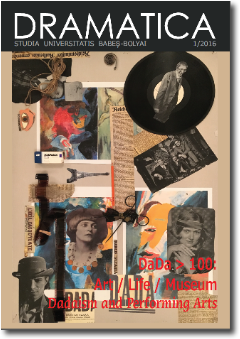LE RÉCIT ET LE NÉANT
THE STORY AND THE NOTHINGNESS
Author(s): Till R. KuhnleSubject(s): Theatre, Dance, Performing Arts
Published by: Studia Universitatis Babes-Bolyai
Keywords: Dada; great narratives; discursivity; avant-garde; futurism; expressionism; anarchy; manifesto; Lebensphilosophie; existential thinking; art (concept); disgust; superman; logos.
Summary/Abstract: The Story and the Nothingness. DADA means the subversion of great narratives as frameworks of ideology. Therefore DADA does not only attack tradition in arts and society but – by denying the validity of logos (Tristan Tzara, Hugo Ball, Benjamin Fondane) – also the manifestoes of movements of the historical avant-garde as Futurism, Expressionism or – later – Surrealism, because they try to impose their “discursivity” (term used by Foucault almost in the sense of lat. topica) on arts and society. In other words, the avant-garde ends up creating its own tradition. In that way, the principle of the avant-garde might be described as the permanent revolution of tradition. Thus DADA has become a critical movement within the historical avant-garde. One answer to the dilemma of the avant-garde can already be found in the works of Nietzsche; and the influence of his philosophy especially on the early movements of the historical avant-garde (Futurism, Expressionism, Vortex…) cannot be denied. In its radical negativity DADA wants to surpass not only the contradiction within avant-garde but also Nietzsche’s superman and primitive anarchism to reach a higher degree of individuality which shall be no more in conflict with humanity (Raoul Hausmann): Dadaists have become the anarchists of anarchy. And the ethical imperative of DADA prevails in the writings of Guy Debord. Located at the hiatus of negation and great narrative DADA is more than absurd, it means the laughter of διάβολος, “the one who separates”.
Journal: Studia Universitatis Babes-Bolyai - Dramatica
- Issue Year: 61/2016
- Issue No: 1
- Page Range: 93-109
- Page Count: 17
- Language: French

